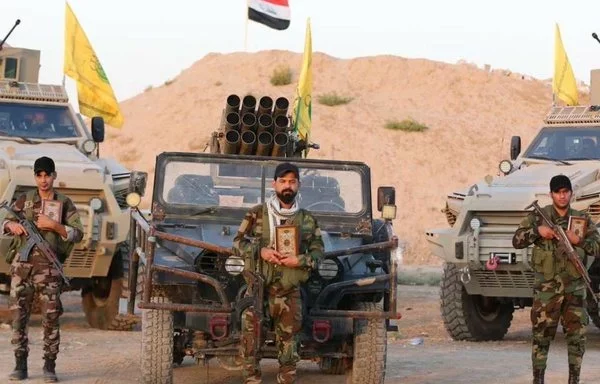Security
IRGC military equipment enters Syria via Iraqi crossing
Arms shipments arrive in Syria from Iran via Iraq through two main crossings: al-Qaim-Albu Kamal, and Sikak, an illegal military crossing.

By Anas al-Bar |
The Islamic Revolutionary Guard Corps (IRGC) continues to send weapons and military equipment to its affiliates in Syria, with new shipments of Iranian missiles and drones flowing into Deir Ezzor via Iraq, sources in Syria said.
The latest batch of weapons arrived May 21, concealed inside refrigerated trucks, according to the Syrian Observatory for Human Rights.
Before that, Iran-backed Iraqi militia Kataib Hizbullah brought in a shipment of suicide drones and surface-to-surface missiles on May 9 through Sikak border crossing in the town of al-Hari, per the Eye of the Euphrates network.
The shipment ended up in the "Iranian square" in al-Salhiya, a town on the western bank of the Euphrates river between al-Mayadeen and Albu Kamal.
The "Iranian square" is a hub where heavy military vehicles, weapon depots and dozens of Syrian and foreign militiamen are based, under the supervision of a Lebanese commander known as "Abu Rabie," the network said.
The smuggling of arms shipments to Syria from Iran via Iraq is ongoing, Syrian journalist Ahd al-Salibi told Al-Fassel.
The flow of weapons may stop for a while when air strikes target the IRGC at the border, but they eventually resume, he said. A number of high-ranking IRGC officials and affiliated militiamen have been killed in the strikes, which have targeted militia headquarters buildings and safehouses, a training facility and a command and control position, as well as weapon depots and convoys transporting arms.
IRGC affiliates "smuggle not only weapons but also drugs and almost everything, such as livestock, food and electrical goods," he said, via two main crossings: al-Qaim-Albu Kamal, and Sikak, an illegal military crossing.
The Iraqi affiliates bring in most of the fighters, weapons and other equipment, such as drone control devices and replacement parts for the repair of signal and guidance stations, to Iran's proxies in eastern Syria via Sikak, he said.
Fatemiyoun Division militiamen repair the stations destroyed by air strikes.
Repositioning of commanders
The influx of weapons coincides with new plans adopted by the militias to protect their commanders and fighters from bombardment.
These involve repositioning and redeployment, night patrols and changes in command, as well as a moratorium on appearance in public.
According to local sources, the Syrian regime recently reinforced its military positions in al-Mayadeen and the Deir Ezzor desert with additional units.
Militia leaders also held a series of meetings to discuss strengthening their economic and military interests in the border areas by opening river crossings for smuggling in Deir Ezzor and recruiting new fighters.
Local residents have been increasingly hostile to the "militarization" of their areas, al-Salibi said.
"A number of notables and residents have made repeated demands to the militias on the necessity of moving their headquarters and weapon depots outside residential neighborhoods," he said.
"But their voices remains weak against the sway held by these militias, which do not accept any voice that opposes their destructive plans and projects."
Enough of the Iranian Islamic State. O God, grant Assad victory over the terrorists in Deir Ezzor and all other areas.